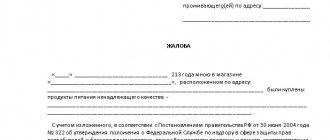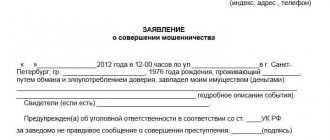It is possible to carry out business activities in the Russian Federation only if you are registered as an individual entrepreneur or a legal entity. But citizens do not always do everything according to the law and often do not want to spend time obtaining the necessary licenses and permits. If an individual without registration with the tax authorities engages in business for the purpose of making a profit, we are talking about illegal entrepreneurship. In this case, the citizen does not pay taxes and conducts activities at his own discretion, without adhering to general requirements and standards. Having identified such a fact, you should contact the regulatory authorities, who will conduct an inspection and bring the violator to justice as provided for by law.
Types of illegal entrepreneurship
Any commercial activity that is conducted without complying with applicable legal regulations is illegal. This applies to cases where the entrepreneur:
- sells goods or provides services without registering with the tax office;
- conducts activities that do not correspond to those indicated in the documentation (for example, does not repair cars, as indicated in his certificate, but is engaged in their sale);
- did not obtain a license or permit, despite the fact that this is a prerequisite for his work;
- provided the registration authority with knowingly false information, on the basis of which he received a certificate or permit.
Remote work (for example, selling goods) is also considered entrepreneurship, and it must be registered in the manner prescribed by law.
What IP violations can you file a complaint about?
Any entrepreneur must carry out his activities within the framework of current legislation. Violation of norms in some cases gives third parties the right to file a complaint with the appropriate authority. However, not all violations lead to this outcome.
You can file a complaint in the following actions:
- if he does not pay taxes or fees, hides income or operates in the absence of rights or permits;
- violates labor standards, for example, does not provide proper conditions for workers or does not pay wages. This issue is considered in various ways, including in civil law. Complaining is just one option;
- carries out activities at the place of residence in the absence of such an opportunity. For example, production is deployed in an apartment, which can only be implemented in non-residential premises;
- violates the rules for the sale of goods or provision of services. For example, does not issue a check, does poor quality work, performs agreed actions in violation of deadlines;
- does not pay for services, as well as for goods received. Most often, such situations are considered in court, but not in the form of a complaint, but in the form of a statement of claim;
- violates administrative or criminal regulations. This may be illegal business, failure to comply with the requirements of a state or municipal body, and so on.
This is not an exhaustive list of violations, but only the most basic points. Their verification can begin after filing a complaint.
How to determine that an activity is being conducted illegally
If a woman once acted as a nanny for someone else’s child and received monetary compensation for her work, this is not considered entrepreneurship. But if she works as a nanny on a permanent basis, this will qualify as entrepreneurial activity. Stable receipt of revenue from the provision of services or the sale of goods is a direct basis for registration with the tax authorities. The following factors may indicate a lack of legal status:
- there is no photocopy of the registration certificate in the consumer corner;
- the person providing the service or selling the product refuses to present the necessary documents upon request;
- the entrepreneur works only online, makes sales through a website or social network without indicating a legal address;
- You can pay the cost of goods/services only to a bank card opened for an individual (not for an entrepreneur);
- the contract specifies one amount, but in fact the client pays more, but contributes part of the funds in cash;
- Payment is accepted only in cash, no confirmation of payment document is issued;
- there is no response to a complaint regarding the quality of goods or services, etc.
Lack of profit when carrying out illegal business activities does not relieve the violator of responsibility.
How to file a complaint
How to write a complaint against a company (LLC)
You can submit a complaint to the territorial body of the Federal Tax Service in person or through a representative by proxy at the document acceptance window. You will need to have with you identification documents and a second copy of the complaint, on which, when accepting the documents, the tax officer will mark receipt.
You can also send documents by registered mail with a list of attachments and acknowledgment of delivery. The notification will be proof that the department has received the request.
For your information! You can file a complaint through a special service of the Federal Tax Service. You will need to fill in all the required fields, write the text of the complaint, attach documents, leave your contact information and click the “Submit” button. Also, if you have a personal account on the tax office website, you can submit an appeal through it.
After receiving and considering the request, the department will send a response. The review period is 30 days from the date of registration of the complaint. The Federal Tax Service may contact the sender to obtain the necessary information.
Sample complaint to the tax office about illegal business from a legal entity
Complaint
I, Aleksey Alekseevich Smirnov, General Director of Gladiolus LLC, report the known fact of entrepreneurial activity without registration with the tax authority. Lyubimov Nikolay Nikolaevich, born in 1994, living at Izhevsk, st. Avangardnaya, 234, apt. 300, is engaged in the wholesale and retail sale of cell phones. A sales point has been opened in the Asia shopping center at the address: Izhevsk, st. Zimnyaya, 13A, office. 6. This citizen has repeatedly contacted our organization with an offer to supply us with a batch of cell phones (letter attached).
Based on the above and in accordance with Article 116 of the Tax Code of the Russian Federation, I ask you to take action and report the result of consideration of my appeal by mail to the address: 426008, Izhevsk, st. Osinovaya, 12A, Gladiolus LLC.
Application:
Letter with a proposal for cooperation dated November 20, 2021 from Lyubimov N.N. for 1 l.
Smirnov / A.A. Smirnov November 25, 2021
Sample complaint to the tax office about illegal business from an individual
To the Interdistrict Inspectorate of the Federal Tax Service No. 8 of Izhevsk for UR, address: 426053, Izhevsk, st. Voroshilova, 35 from Guseva Valentina Ivanovna, registered at the address: 426032, Izhevsk, st. Dubovaya, 53, apt. 22 tel.
Complaint
I, Guseva Valentina Ivanovna, passport series 9400 No. 123123, issued by the Industrial District Department of Internal Affairs of Izhevsk on May 12, 1997, living at the address: 426032, Izhevsk, st. Dubovaya, 53, apt. 22, I am informing you of the known fact of illegal business activity by Olga Yuryevna Sidorova, living at the address: 426032, Izhevsk, st. Dubovaya, 53, apt. 25. Sidorova O.Yu. has been providing educational services (tutoring) for 3 years without registering with the tax authority.
Based on the above and in accordance with Article 116 of the Tax Code of the Russian Federation, I ask you to take action and report the result of consideration of my appeal by mail to the address: 426032, Izhevsk, st. Dubovaya, 53, apt. 22.
Guseva / V.I. Guseva October 20, 2021
Where to go
Any person residing in the territory of the Russian Federation (including non-residents) has the right to file a complaint against illegal business. It does not matter whether he accidentally found out about the violation or used the services of an illegal entrepreneur. You can contact the following regulatory authorities:
- Territorial division of the tax service. An entrepreneur who is not registered with the tax authorities does not make mandatory contributions (to the social insurance fund, pension fund, etc.). Accordingly, a complaint to the Federal Tax Service will help to quickly establish the fact of a violation with all the ensuing consequences. It is better to submit your appeal to your territorial unit. In particular, if illegal business activity is carried out on the territory of Moscow, when filing a complaint you should be guided by the information https://www.nalog.ru/rn77/apply_fts/#t2.
- Department of Economic Security. This Office investigates economic crimes. If necessary, the submitted statement of violation will be transferred to the Prosecutor's Office or the Tax Service.
- Prosecutor's office. If there is reason to believe that the activities of an entrepreneur contradict the norms of the Criminal Code of the Russian Federation (for example, he offers services prohibited in Russia), you should complain to your territorial division of the Prosecutor's Office https://genproc.gov.ru/contacts/map/?DISTR=&SUBJ =.
- Court. A citizen will not have to personally go to court if the fact of illegal business activity is revealed. This will be done by the regulatory authorities, where he will submit a complaint and materials indicating a violation. But a citizen has the right, on his own initiative, to go to court to seek material or moral compensation for the damage caused.
Attention! A complaint cannot be submitted anonymously. If the document does not contain the applicant’s information, it will not be considered within the period prescribed by law.
About entrepreneurship and violations
Illegal entrepreneurship involves the systematic receipt of proceeds by an unregistered businessman
If we talk about clear terminology, entrepreneurship is understood as employment aimed at regularly generating revenue, taking into account work planning and probable risks.
Moreover, the person who completes the task uses personal starting capital.
The first condition for such activity is the opening of an individual entrepreneur or company with appropriate entry into state registers.
Since legalizing a business requires regular transfers of funds to the state, budding entrepreneurs “save” on officially opening a business.
In such cases, the authorities allow concessions for newcomers.
However, increasing business turnover and systematically generating income is a reason for registering a commercial enterprise. Unscrupulous businessmen take advantage of loopholes in the law to reduce operating costs.
Important ! When a businessman works without the consent of the state, such actions are considered illegal business.
Moreover, the concept under consideration receives a broader interpretation. In addition to the lack of registration, illegal business includes the circulation of goods prohibited in the country. There are also illegal actions of businessmen, for example, human trafficking or home births. In addition, work outside the legal framework includes conducting business without obtaining special permission - a license.
Examples
Let's consider typical situations when it is appropriate to report illegal business to regulatory authorities. Let's start with a common case in Russia - illegal trade.
If a citizen sells personal property, for example, a sofa, in such circumstances it is too early to report violations. However, when furniture sales are on stream, it is advisable to clarify why the businessman works but does not pay taxes.
In cases where a company registered in the Unified State Register of Legal Entities that removes solid waste operates without a license, it is appropriate to report a violation of the law. The same rule applies to a clinic that practices manipulation or surgery at patients’ homes. Moreover, in this situation, the presence of a license and registration of a company does not play a role.
How to complain about illegal business activities
Before contacting the regulatory authority, it is important to make sure that the person who sells the product or provides the service does not have legal status. To do this, you should ask for a certificate of registration, if such a document is not freely available to clients (this is also a violation of the law). If this request is not satisfied, then this is the basis for contacting the tax service.
If a copy of the state registration certificate is posted in the consumer’s corner or the entrepreneur presents this document upon request, you should:
- Make sure that the original certificate really exists. This can be done by submitting a request to receive information from the Unified State Register of Legal Entities/Unified State Register of Legal Entities https://egrul.nalog.ru/index.html. Data will be provided according to a given criterion (this may be the name of the entrepreneur, his TIN or other information from the certificate). The downloaded statement will reflect all search results that can be used to determine the authenticity of the copy. If there is no information, we are talking about illegal business activity.
- Make sure that the certificate is not a fake. When comparing data from extracts from the Unified State Register of Legal Entities/Unified State Register of Individual Entrepreneurs and copies, it is important to check all the information available in the documents (literally every number and letter). Fraudsters often try to use real state registration certificates from the registry, “substituting” their data in the copy. Having identified a discrepancy, you should contact the Prosecutor's Office for fraud.
- Collect a sufficient amount of evidence.
- Submit an appeal to the authorized body. If the applicant is not sure that he can cope with such a task on his own, it is better for him to use the help of a specialized lawyer;
- Make a complaint.
Information from the Unified State Register of Legal Entities/Unified State Register of Individual Entrepreneurs is provided free of charge.
Description of the general procedure
The main thing before applying is to make sure that the entrepreneur is actually violating current laws and regulations. Evidence must be collected. An example of a violation is when, when contacting representatives of a law firm, its employees refuse to issue a license, although their activities require detailed documentation and support. This can be used as confirmation of unauthorized business activity.
Cases where the documents record an amount less than what the client actually paid deserve special consideration. This means that management is trying to evade paying official taxes. You can use any materials:
- Written forms.
- Collected audio files if the previously described source of information is not available.
- It is allowed to collect video footage.
The more serious and weighty the evidence, the better. Otherwise, the regulatory authorities will say that there is no corpus delicti. And the application will once again remain without consideration. You can submit a complaint while maintaining anonymity. That is, no one will know which citizen drew up the document.
Important
The main thing is to contact government officials in advance to get advice. They will tell you how to properly fill out applications. They will explain how to provide evidence so that it is accepted for consideration along with other materials. They will give hints regarding information content and accuracy in solving crimes.
Evidence base
The more additional materials indicating a violation the applicant can provide, the faster the appeal will be considered. In order to properly prepare the evidence base, you can directly contact the regulatory authority where the application will be submitted. The helpline or hotline will definitely tell you what materials can confirm the fact of illegal business activity. For this purpose the following are often used:
- Photographs or video footage of an office/store where goods are sold or services are provided, it is recommended to focus on the absence of a consumer corner;
- photocopies of payment receipts for the transfer of funds in favor of an individual as payment for goods/services, it is important that the purpose of the payment states what the payment was made for;
- a screenshot of a social network page or online store where goods are sold without registration;
- a copy or photograph of the false certificate that was provided to the client;
- a newspaper page or advertising brochure where an advertisement for the provision of services/sale of goods is posted (without registration it is prohibited to submit advertisements of a commercial nature);
- audio recording of a conversation with the “entrepreneur” or his authorized specialist;
- a copy of online correspondence about purchasing products or receiving services;
- an extract from the Unified State Register of Legal Entities/Unified State Register of Individual Entrepreneurs confirming that the entrepreneur does not have official registration;
- photocopy of the contract for the provision of services, which actually has no legal force, etc.
It is better to submit copies of materials rather than originals to regulatory authorities in order to reduce the likelihood of their loss.
Grounds for filing a complaint
Citizens who notice tax violations by entrepreneurs can file a complaint with the Federal Tax Service. The most common reasons are the following:
- Non-payment of taxes. By law, employers are required to pay personal income tax for their employees. The tax is deducted from their salaries and transferred by the accountant no later than the day they are paid.
- Deduction of insurance premiums from salary. According to the law, personal income tax is paid from wages, but the employer transfers pension contributions and payments to the Compulsory Medical Insurance Fund for each employee from his own funds, calculating them from the amount of wages. Often, individual entrepreneurs simply deduct them from staff salaries in order to save their own budget.
- Refusal from official employment. This is usually done by entrepreneurs to evade taxes and contributions. There are two violations here: in addition to non-compliance with the norms of the Tax Code of the Russian Federation, the manager also violates the labor rights of the staff. The issue can be dealt with by both the Federal Tax Service and the State Labor Protection Service.
- Illegal business activity. After registration as an individual entrepreneur, each entrepreneur is issued an extract from the Unified State Register of Individual Entrepreneurs, which indicates OKVED codes in accordance with the activity. If a businessman wants to add a new line of business, he is obliged to notify the tax office about this and enter new codes.
Thus, the basis for sending a complaint to the Federal Tax Service can be any violation by an entrepreneur of the norms of the Tax Code of the Russian Federation.
How to compose a document
Regardless of where the complainant plans to apply, he will need a written complaint. When drawing up such a document, the following information must be indicated:
- details of the parties (applicant and recipient);
- identification data that can be used to determine where the activity is carried out (address of a page on a social network or link to an online store, postal address, etc.). If there is no accurate information, it will be difficult for the regulatory authority to identify the violator;
- the nature of the illegal act: sale of goods, rental of real estate, tire fitting, repair of household appliances, sale of alcoholic beverages, etc.;
- the systematic nature of the act, if the applicant has such information, it is important to indicate that the provision of services or the sale of goods is carried out on an ongoing basis, otherwise the requirements will be refused;
- reference to legislative acts that were violated (in particular, Articles 32 and 116 of the Tax Code of the Russian Federation, Article 15 of the Constitution of the Russian Federation, etc.);
- a list of requirements upon the fact of the complaint: conduct an inspection, assess the actions of the person specified in the complaint in terms of the presence of corpus delicti, take measures, report the results of the consideration, etc.;
- a list of additional materials;
- date and signature.
In accordance with the norms of current legislation, the submitted application will be considered within 30 days. Its registration must be carried out within 3 days from the date of receipt (regardless of how the applicant transfers it).
Algorithm for drawing up an application
There is no strict algorithm for drawing up an application. Of course, the employees help compile it. But we will give examples of how to compose it.
Statement on illegal business activities: sample.
As for OBEP, the statement will be somewhat different. start drawing up such a document with the “header” . It should contain information such as: the official to whom the application is addressed, information about who drew up the document, namely, full name, passport details and residential address, telephone number for contact.
The "header" should be located in the upper right corner . In addition, it must indicate that the applicant is aware that giving false testimony is subject to criminal liability. These words must be marked the current date and signature of the applicant.
Next, in the middle of the sheet you need to write the word “Statement” and in free form state your assumptions about the illegal business.
To the tax office
Here in the application it is very important to indicate such information as the applicant’s full name and place of residence. In addition, when drawing up this document, you need to clearly and clearly state the essence of the problem.
Question answer
Question: A low-quality product was purchased from an online store. The seller ignored the request for its replacement or return, despite my promise to contact Rospotrebnadzor. There is reason to believe that he is working illegally. How can I get a refund in this situation?
Answer: If the seller does not have the necessary registration documents, then there is no point in contacting Rospotrebnadzor, since it controls the activities of only legal retail outlets. In this case, it is better to immediately file a complaint with the Prosecutor's Office or the Federal Tax Service. But if the entrepreneur does not want to return the money voluntarily, then it will have to be recovered through the court.
Question: There is an illegal car wash in the courtyard of a residential apartment building (2 garages have been converted into it). An initiative group of residents has repeatedly appealed to its owner with a demand to provide registration documents. But he does not want to make contact, citing the fact that this is his private territory and he can do whatever he wants on it. What to do in such a situation?
Answer: The first thing to do is try to collect an evidence base. You can take a video of cars driving into a car wash and then leaving. This will be enough to prove a violation of the current law. If such material is available, you can file a complaint with the regulatory authority. It is preferable that all members of the residents' initiative group sign it.
Question: I am buying old washing machines and refrigerators from individuals. I act on behalf of the organization, which then disassembles them into parts. Can my work be classified as entrepreneurship and will I face administrative liability?
Answer: If you act on behalf of the employer, then, in accordance with Art. 14.1 of the Administrative Code, you do not face any liability. You do not receive income and are not an illegal entrepreneur.
In what cases will the activities of an individual be recognized as entrepreneurial?
Reclassification by the tax authority of an individual’s activity is possible only if there are key signs indicating its entrepreneurial nature.
One of the main factors is the focus on making a profit, i.e. production or acquisition of property for the purpose of its subsequent use for systematic income generation. The one-time nature of the transaction in itself does not indicate the conduct of entrepreneurial activity. For example, a one-time sale of property or building materials remaining after the construction of a house does not have signs of entrepreneurial activity. But if you regularly acquire property assets for the purpose of subsequent sale or rent out vehicles, the tax authority has the right to equate this activity to entrepreneurial activity and charge additional VAT, establishing the systematic implementation of transactions and the absence of facts of use of real estate for personal purposes (see Resolution of the Arbitration Court of the Ural District dated December 27, 2021 No. F09-8236/17).
The following facts may also indicate the presence of signs of entrepreneurial activity in actions.
- Economic accounting of operations related to transactions. This concept means the presence of primary documents for transactions: acts, contracts, prices for services.
- The interconnectedness of all transactions performed in a certain period of time. For example, the absence of a time interval between the acquisition and subsequent sale of objects, the simultaneous incurrence of expenses for the repair of objects for their resale and advertising costs. Judicial practice shows that in order for the tax authority to confirm the circumstances of an individual conducting business activities, a combination and interconnectedness of actions indicating a tax offense are necessary.
- Stable connections with sellers, buyers, and other counterparties. An individual’s request for services from certain counterparties indicates the presence of systematic “business customs” confirming the implementation of entrepreneurial activities (see letters of the Ministry of Finance of Russia dated November 7, 2006 No. 03-01-11/4/82 and the Federal Tax Service of Russia dated February 8, 2013 No. ED-3-3/ [email protected] ).
The legislative framework
To correctly file a complaint, you can be guided by the following legislative acts:
- Code of the Russian Federation on Administrative Offenses dated December 30, 2001. N 195-FZ (as amended on July 31, 2020).
- Tax Code of the Russian Federation dated July 31, 1998. N 146-FZ (as amended on July 20, 2020).
- Civil Code of the Russian Federation dated November 30, 1994. N 51-FZ part I (as amended (07/31/2020).
- Federal Law “On the procedure for considering appeals from citizens of the Russian Federation” dated May 2, 2006. N 59-FZ (as amended on December 27, 2008).
- Federal Law "On the Prosecutor's Office of the Russian Federation" dated January 17, 1992. N 2202-1 (as amended on July 31, 2020).








